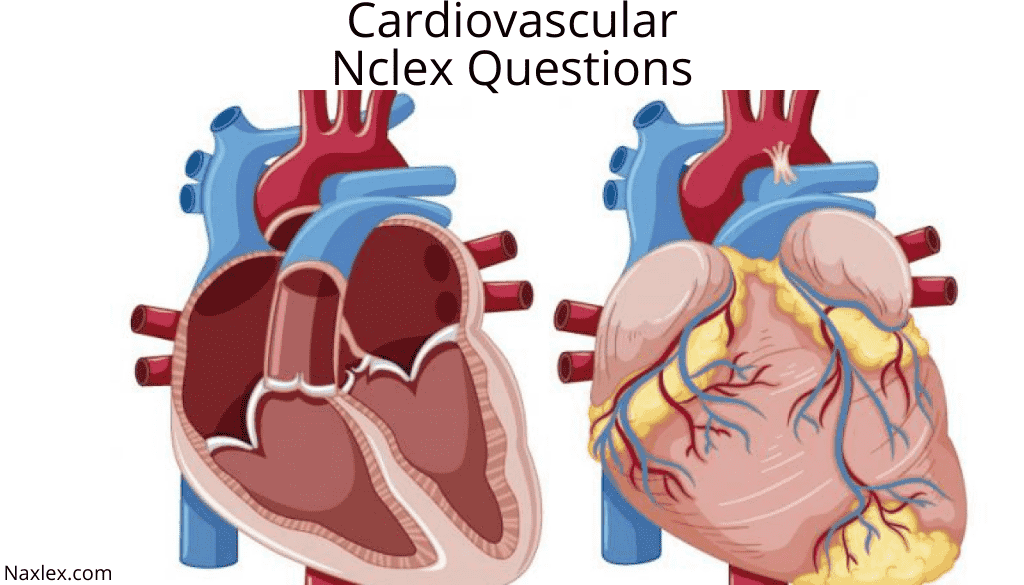Cardiovascular NCLEX Questions
The NCLEX is the most important test for prospective nurses who wish to be certified. To pass the test, you must have a firm grasp of the fundamentals of nursing, which includes learning all about the cardiovascular system. Certified nurses should be well-equipped and knowledgeable about cardiovascular issues because heart health is vital to patient care. We will focus on discussing tips and strategies that will enable you to be confident when the time comes for you to respond to cardiovascular NCLEX questions.
How can Naxlex help?
Using NCLEX practice questions is the best way to prepare for the real test—not only cardiovascular NCLEX questions but all NCLEX problems. Naxlex is the most convenient website for all nursing students. Our tried-and-true method has helped thousands of nursing students succeed on their NCLEX by reducing their study time and helping them make it through nursing school lectures and pass their exams.

The Importance of Heart Health in Nursing
The cardiovascular system plays a major role in oxygen circulation, nutrient transport, and excretion of waste products out of the body. To offer the best care to their patients, nurses need to know everything about the cardiovascular system's anatomy, physiology, and diseases associated with cardiovascular disorders.
Cardiovascular NCLEX questions structure
Let's learn more about the cardiovascular system to help you study for the NCLEX. This complex system is crucial in maintaining normal body functions and keeping the body in good shape. To help you review, here are some important points:
The Circulatory System: Blood, blood tubes, and the heart are the elements that comprise the circulatory system.
Some of the circulatory system functions include transporting oxygen and other nutrients into the cells, transporting hormones, and getting rid of unwanted waste from the body.
The heart is the main organ that is responsible for circulating blood around the body, and cardiovascular disorders are diseases that affect the heart and blood vessels.
These are the topics you should consider when studying for the NCLEX:
Dysrhythmias: This condition is characterized by irregular heart rhythms it is also known as cardiac arrhythmia
EKG Interpretation: How to read Electrocardiograms accurately.
Heart Failure: When the heart ceases to work properly.
Heart attack, also called myocardial infarction.
Hematologic Disorders are illnesses that affect the blood.
How to Answer Cardiovascular NCLEX Questions
1. Pay attention to cardiovascular details:
Be keen on the unique parts of the heart when answering renal NCLEX practice questions about the heart and blood vessels. You must be familiar with the heart's structure, rhythms, and common heart problems to be able to pass the exam.
2. Know how the body works:
Learn about the physical processes that take place in the cardiovascular system. This includes how the heart pumps blood, what valves do, and how oxygenated and deoxygenated blood moves through the body.
Understanding cardiovascular physiology is crucial in understanding a patient's symptoms and how to assist them in practical situations.
3. Watch out for the signs and symptoms:
Carefully examine the patient's symptoms and signs. When dealing with cardiovascular issues, you should look out for chest pains, difficulties in breathing, swellings, odd heart sounds, and changes in blood pressure.
Correctly recognizing and understanding cardiovascular symptoms is important for acting quickly and providing essential patient care.
4. Know about medications and treatments:
Knowing about heart medicines and procedures like anticoagulants, antiarrhythmics, and cardiac tracking is vital. It would be best to learn about their uses, when they shouldn't be used, and possible side effects.
A big part of cardiovascular nursing is ensuring that drugs and interventions are given safely. Being well-informed can help patients recover quickly.
5. Get better at reading ECGs:
Regularly practice reading electrocardiograms. ECGs are very important for diagnosing and assessing heart problems. It is significant to learn about the most frequent arrhythmias and ECG waveforms.
Reading an ECG is important for nurses caring for patients with cardiovascular complications. If you are good at this, you will be better able to spot and deal with cardiovascular issues quickly and efficiently.
Nursing Care for Heart Failure (CHF) and How It Works
Practice critical thinking:
When you think about the unique demands of cardiovascular nursing, always use your critical thinking skills and put patient safety first.
If you are a new nursing student, the phrase "cardiac NCLEX questions" might initially seem scary. Here's a secret, though: once you get used to responding to these questions, you might fall in love with the complex way the heart works.
Learning about heart physiology and pathophysiology isn't just for passing tests; it's for becoming a well-rounded, confident nurse. With its chambers, valves, and electrical paths, the heart works like a well-rehearsed dance, ensuring oxygen-rich blood gets to the cells and tissues that need it the most. This is the basis of care and affects many disease processes.
As you learn more about nursing, you'll understand that what your heart knows becomes your guide. Your knowledge of heart anatomy will help you whether you're treating chest pain in the emergency room or keeping an eye on someone with heart failure in a long-term care facility. It's like having a reliable North Star to help you navigate the huge ocean of healthcare situations.
Conclusion: Cardiovascular NCLEX questions
NCLEX questions about heart health are not just problems to solve but also chances to learn more about this interesting subject. You'll see trends and will be able to respond easily to the questions as you go through them. It's like putting together puzzles: the more you do it, the better you get at putting together the heart piece.
But remember that it's not just about numbers and facts; it's also about learning to care for your people confidently and kindly. With each right answer to a cardiac question, you get closer to becoming that nurse who can see small changes in a patient's ECG, tell when arrhythmias start or act quickly in cardiac emergencies.
Do not be afraid to enter the world of cardiac care. Don't just try to get good at cardiovascular NCLEX questions; excel in this area too and let Naxlex be your guide. You'll quickly learn that the heart's mysteries are waiting to be uncovered. And with each question you answer, you get closer to becoming the skilled and caring nurse you want. Let's keep going and learn more about the amazing circulatory system!
Start your journey with us today
Join 1000+ Nursing Students
Powerful learning and clinical tools combined into one platform. The Naxlex Knowledge and Qbanks give you instant and on-the-go nursing knowledge and guidance.




